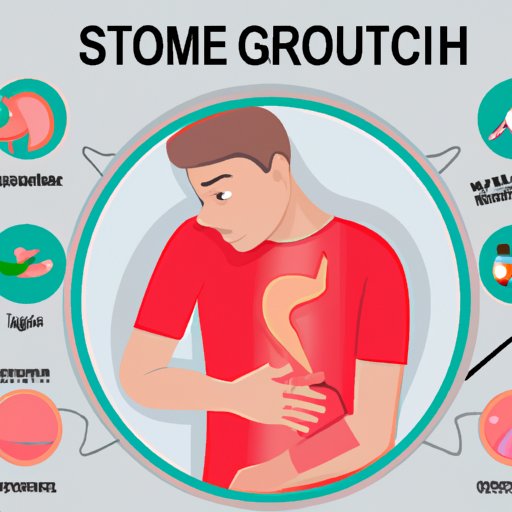
I. Introduction
A stomach bug, also known as gastroenteritis, is a viral or bacterial infection that affects your gut. This condition is common among both adults and children and can vary in severity. In this article, we’ll explore the different symptoms of a stomach bug, how to identify them, how to differentiate it from food poisoning, and when to see a doctor.
II. 7 Common Symptoms of a Stomach Bug You Should Never Ignore
Some common symptoms of a stomach bug include diarrhea, nausea, vomiting, abdominal pain, fever, headache, and dehydration. The symptoms can range in severity, but none should ever be ignored. Diarrhea and vomiting are the most common, leading to dehydration, which can worsen the condition. Abdominal pain can be severe in some cases, and the fever and headache should not be neglected, as they can be signs of more severe infections that require medication.
III. How to Identify a Stomach Bug: Signs and Symptoms
Stomach bugs can take up to three days to show symptoms. When they do, some common signs include nausea, vomiting, abdominal cramps, loss of appetite, diarrhea, fever, and headache. People with weakened immune systems or existing medical conditions such as Crohn’s disease or inflammatory bowel disease may experience more severe symptoms.
IV. What Does a Stomach Bug Feel Like and How Long Does It Last?
Stomach bugs can feel different for everyone, but most people experience symptoms such as stomach cramps, nausea, vomiting, and diarrhea. These symptoms can last from 24 hours to a week, depending on the severity of the infection. For most people, the symptoms tend to disappear within 48 hours.
V. Stomach Virus or Food Poisoning? Understanding the Symptoms
Stomach virus and food poisoning can produce similar symptoms, which can make it hard to differentiate between them. The primary difference is that stomach viruses are usually caused by viral infections, while food poisoning results from consuming contaminated food or water. Symptoms of food poisoning include vomiting, nausea, diarrhea, cramps. They typically appear within six hours of eating contaminated food and can last up to 48 hours.
VI. Your Ultimate Guide to Recognizing and Treating a Stomach Bug
While it’s not easy to prevent stomach bugs, there are steps you can take to make sure you get better quickly. Ensure adequate hydration always to prevent dehydration, eat light meals that are easy to digest, avoid alcohol and caffeine, and rest adequately. Over-the-counter non-steroidal anti-inflammatory drugs such as aspirin and ibuprofen can help relieve symptoms such as pain and fever. Natural remedies such as ginger, peppermint, and chamomile tea can also help relieve symptoms.
VII. When Should You See a Doctor for a Stomach Bug? Warning Signs to Watch For
Most people with stomach bugs don’t require medical attention and get better within a few days. However, if you show the following warning signs, you should seek medical attention: Severe dehydration that doesn’t get better with oral hydration, blood in stools, abdominal pain, or fever that begins after a trip to a foreign country.
VIII. Dealing with a Stomach Bug: Home Remedies to Alleviate Symptoms
When dealing with a stomach bug, you can try home remedies to alleviate symptoms. Some of the top remedies include ginger tea, warm compresses, and peppermint essential oils. Other remedies include probiotics, taking a warm bath or shower, and sucking on ice chips. People with severe symptoms can try over-the-counter medications such as anti-diarrhea medication, antacids, and pain relievers as prescribed by a doctor.
IX. Conclusion
A stomach bug is an unpleasant experience that nobody ever wants to go through. However, knowing the symptoms and seeking early medical attention can ease the process. The most important aspect of dealing with a stomach bug is to ensure adequate hydration, get enough rest, and take steps to relieve symptoms at home. Remember to always seek medical attention if the symptoms persist for more than a week or are severe.





